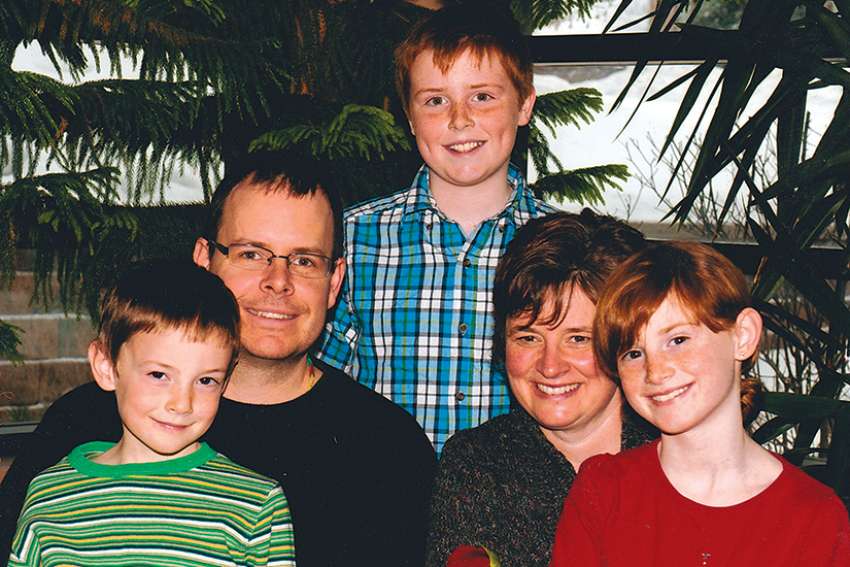The “why” is something Dineen has witnessed whenever he picks his wife Lisa up from the secure nursing home where she lives to take her to Sunday Mass. She came down with a rare, early-onset form of dementia in 2013.
Dementia in its many forms affects almost 600,000 Canadians, steadily robbing them of memory and other cognitive functions.
“She’s almost non-verbal now, but the songs, the recitation of the Lord’s Prayer — I know for a fact that she’s in familiar (territory). She may not be able to name the parish, but she is somewhere where she knows it’s her second home,” he said.
But Dineen has seen other parishioners mumbling and grumbling when Lisa stands when everyone else is kneeling, or speaks when the congregation is silent — small behaviours can be accommodated with a little understanding. Parishes need a basic education in dementia if they’re going to be ready for the increase in dementia-affected parishioners over the coming decade, Dineen said.
If church is the place where those with memory loss still have memories, if it’s where those who face every day in confusion are not confused, and if it’s where the person who lives with constant anxiety is not anxious, churches should be prepared to welcome them, said Dineen.
David Rebelo, palliative care chaplain at Providence Healthcare in Toronto, sees how daily Mass, prayers and hymns bring calm and hope to patients struggling to clear a path through their synapses.
“I see people who, whether they have dementia or not, their most important thing is to be at Mass,” Rebelo said. “I saw it with my own dad. I mean, he insisted on going to church every day when he started to have dementia and it developed into Alzheimer’s.”
While most Catholic church-goers are kind and try to be helpful to fellow parishioners who have memory loss, that’s a long way off a plan to deal with a 66-per-cent increase in dementia sufferers over the next 12 years predicted by the Alzheimer Society of Canada.
“There ought to be a specific plan,” Rebelo said.
Dineen has been working on a plan for dementia sufferers ever since his wife’s diagnosis.
On one front, he worked with NDP MP Claude Gravelle on a private member’s bill calling for a national dementia strategy. On another, he talked to his pastor, his bishop and eventually the Canadian Conference of Catholic Bishops, pointing out the huge numbers of Catholics who will either have some form of the disease or be caring for a wife, a husband, a mother or a father with dementia.
Gravel’s bill came within one vote of passing early in 2015. After the federal election, Conservative MP Rob Nicholson resurrected it and since 2017 the law has dictated the government must present Parliament with a comprehensive, national dementia strategy.
In the 2019 budget, the government committed $50 million over five years to make Canada more ready to cope with a disease that is projected to afflict almost a million Canadians. The full national plan will be revealed late in May or early in June.
Meanwhile, the bishops who were busy opposing euthanasia and unable to join Dineen’s battle a few years ago are now faced with the possibility that euthanasia will be extended to people with dementia, Dineen points out.
Dineen is beginning to get a sympathetic hearing from his own Archdiocese of Ottawa. He’s also taking a course in pastoral care in medical settings.
At the Alzheimer’s Society of Saskatchewan, public awareness co-ordinator Abby Wolfe has had some success helping Anglican and Lutheran parishes think their way through dementia. She’s made presentations to staff and volunteers, helping them to imagine what it’s like for a person with dementia to arrive at the front door of the church and make their way into the building.
“We know that people with dementia have changes in the way they process visual information,” said Wolfe.
“So something like a black mat near a doorway, or patterned flooring, might be perceived as a hole or perhaps water or a wet area,” she said.
Having people ready to guide, reassure and even lend a supportive arm as they walk to their pew can make a huge difference.
“It’s already sort of that ingrained nature to be supportive, to be welcoming and to look out and to care for our community members, especially in church,” Wolfe said.
The worst thing that can happen is to have people dismissed or ignored, said Alzheimer Society of Canada communications director Rosanne Meandro.
“We need to correct some misinformation that’s out there,” she said. “People with dementia — I mean, one of our spokespeople (with dementia) says it’s just another bump in the road of life and I’m just going to make the most of this and try to get on with living as best I can.”
Dineen said he expects more of his Church than he’s seeing.
“The first principle of Catholic social teaching — the Church has a duty to honour the person as they are, even though that person has changed. Church means universal and all are welcome. So how are people with dementia being welcomed?”
Support The Catholic Register
Unlike many other news websites, The Catholic Register has never charged readers for access to the news and information on our site. We want to keep our award-winning journalism as widely available as possible. But we need your help.
For more than 125 years, The Register has been a trusted source of faith based journalism. By making even a small donation you help ensure our future as an important voice in the Catholic Church. If you support the mission of Catholic journalism, please donate today. Thank you.


